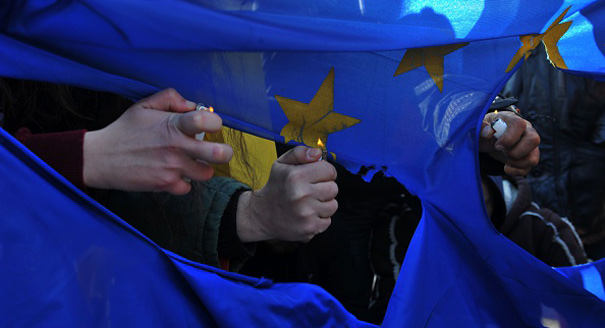During the heady months of 2004, Brussels was the place to be. The EU was the organization to join. Europe was brimming with optimism and confidence.
On May 1 of that year, eight countries from Eastern and Central Europe became EU members. Poland’s Mission to the EU threw a marvelous party. There was a cacophony of languages. There was dancing, singing, and a real sense of relief. Poland and other countries in the region had returned to Europe.
There was also a sense that this bigger, united EU was ready to exert its influence beyond its borders. Almost twelve years later, that Europe is hardly recognizable.
This is confirmed by a new report by the World Economic Forum called Europe: What to watch out for in 2016-2017. To say it makes grim reading is an understatement. “European leaders must deliver solutions, and fast, if they want to prevent support for the EU [from] imploding in coming years,” the report states.
The EU has always had its share of doomsayers. But what is particularly worrying about this report is the Eurobarometer survey it cites. Respondents were asked what were the most important issues facing the EU at the moment. The first in the list was migration, mentioned by some 58 percent of those surveyed. The last was the EU’s influence in the world, cited by about 6 percent. What a depressing indictment of Europe’s priorities: influence doesn’t matter.
The report also reflects how the EU’s influence inside Europe is waning, and this is more troubling. If the EU’s role is weakening or if the bloc is less attractive even to its own members, how can the EU have influence beyond its borders?
The EU’s values are under threat in many member states. The Polish, Hungarian, and Slovene publics are intent on upholding the role of the traditional family only months after the Irish, once a bastion of Catholicism, voted in a referendum to legalize gay marriage. Warsaw and Budapest are meddling in the courts and the media—not that Italy’s former prime minister Silvio Berlusconi had any qualms over how he used his media empire to further his own interests.
The members of the Visegrad Group, which consists of the Czech Republic, Hungary, Poland, and Slovakia, want nothing to do with the refugees (read Muslims) fleeing the wars in Syria and Iraq. They are not alone. Other countries across Europe are closing their borders too, mostly in response to the growing appeal of populists who are Euroskeptic, oppose immigration, and fear globalization. The November 2015 terrorist attacks in Paris gave the populists a boost.
Those issues aside, the refugee crisis has exposed the inability of the EU to deal with the challenge of migration. Above all, it has shown that most European leaders do not see the connection between helping the refugees and the EU’s influence.
Refugees, migrants, and students who are offered the opportunity to live, work, and study in a democratic country give something back to that country if they remain and integrate. As the Economist argued in its January 29 issue, if migrants and students return to their homeland with new skills, they are more likely to do business with the country that welcomed them.
Other reports make similar arguments about Europe’s dwindling influence. The Eurasia Group’s Top Risks 2016 includes a chapter called “Closed Europe.” In it, authors Ian Bremmer and Cliff Kupchan argue that the rise of populism and nationalism, the erosion of the rule of law, and the risks to the Schengen system of open borders are chiseling away at the principles on which the EU was founded. “Closed Europe is first and foremost a Europe that closes itself up to the outside world, and whose countries close themselves up to one another,” the authors write.
Merkel is key to the EU’s future and influence. She has kept the eurozone countries afloat, although the single currency’s woes are far from over. She has kept the EU together in standing up to Russia despite wavering from her Social Democrat coalition partners and other EU leaders. She has tried to preserve Europe’s values of humanity and decency through her open-door policy toward the refugees.
Yet for all that, Merkel has been pilloried by several European leaders. She has been denied the solidarity that Germany had unflinchingly extended to its EU allies when asked. As a report by Citi GPS argues, the basic tenets of the European model of liberal democracy that Merkel is trying to defend are being challenged. And with it, Europe’s influence.






.jpg)